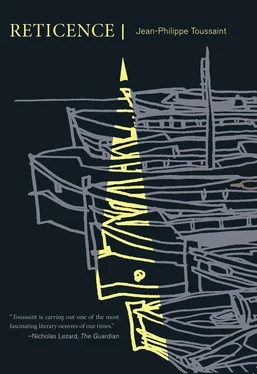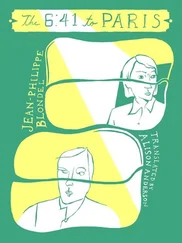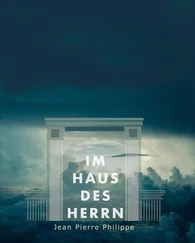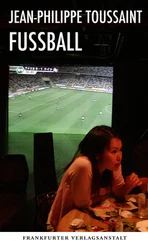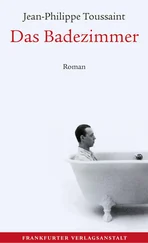It was only then, once silence had returned to the garden, that I remembered that the first time I’d taken the mail from the Biaggis’ mailbox I’d left two letters inside, junk mail or bank statements no doubt. Now, however, those two letters were gone. I walked through the garden over to the house and looked at the umbrella lying on the terrace with its pole still inserted in a concrete base. I wondered how the wind could have knocked over such a heavy garden umbrella while nothing else seemed to have moved on the terrace, neither the earthenware jars on either side of the bay window, nor the garden furniture arranged in the darkness a little farther off. There wasn’t a sound in the garden, and the grounds around the villa were strewn with dead leaves. Looking up at the façade I noticed that one of the shutters on the second floor wasn’t quite closed, and that there was a thin gap between the window and the wall. The hook of the shutter was unclasped and hung against the wall. And Biaggi was hidden there in the shadows, it seemed to me, watching every move I made from the upstairs window.
After remaining undecided on the terrace for quite some time, practically immobile and with my eyes fixed on the shutter, I slowly approached one of the earthenware jars whose silhouette stood out in the shadows. Sticking my hand inside it I felt around for the keys to the garage, remembering that that was where the Biaggis left them when they went away. And in fact I did find them there under a rock, two small metal keys which I took out of a little plastic bag. I’d made up my mind to enter the Biaggis’ house, no more afraid of coming face to face with Biaggi than I already was, knowing he could be watching my every move. I approached the garage door and, taking a last glance at the deserted garden stretching out in the darkness, I inserted the smallest key into the keyhole, lifted the garage door very softly, and slipped silently into the house.
The garage walls were hardly visible in the dark, and a small boat lay overturned on the ground. Various objects were stored along the walls, fishing rods and jerry cans containing oil and gas, and two thick wooden oars lay side by side on the floor. Slowly I advanced through a little metal door and down two steps into a very dark, low-ceilinged cellar, where the dim contours of an almost empty wine rack appeared beside a large shelf filled with cleaning products. My eyes were starting to grow accustomed to the darkness, and I left the cellar and moved on toward the kitchen. Everything was silent there, perfectly neat and tidy, there was no trace of dishes beside the sink and a pile of ironed dishtowels lay beside the stove. Silently I progressed through the ground floor of the house. The shutters were closed all around me and from inside the villa they looked very black behind the bare windowpanes. When I arrived at the little entranceway at the front door I hesitated for a moment at the bottom of the stairs. There still wasn’t a sound in the house, and just across from me, beside a coatrack on which hung the disquieting forms of an overcoat and two raincoats, was a large wooden mirror whose surface was so dark that although I was less than a couple of yards away I couldn’t see the slightest trace of my reflection, just the dense, utter darkness of the deserted entrance.
After hesitating for a moment I went into the living room and, passing in front of the large stone fireplace that loomed in the darkness behind the leather sofa, I crossed the room noiselessly and pushed open the door to Biaggi’s study. That was where he normally worked, but I saw right away that his typewriter wasn’t on his desk. Some papers and a few small objects lay on the mantelpiece, a stapler, an ashtray, two or three rolls of film, and as I moved further into the room I noticed two letters on the desk. Picking them up I saw it was the two letters I’d left in the mailbox a few days earlier. I couldn’t be entirely sure because I hadn’t looked at them closely enough the first time I’d had them in my hands, but they were certainly the same kind of letters, two long rectangular envelopes with transparent windows for the name and address, both addressed to Biaggi, Paul Biaggi. And it was then that I thought I heard a sound in the house, an imperceptible creaking coming from upstairs. I listened attentively but couldn’t hear a thing, neither upstairs nor anywhere else, just the regular distant hum of the refrigerator in the kitchen. I immediately left the study and went back to the front entrance, flattening myself against the wall. The staircase rose in front of me in the darkness, and I could just make out the corridor at the top of the stairs where Biaggi was standing immobile, perhaps, observing me from the shadows of the hallway on the second floor.
I went over to the stairway and started up. I walked up slowly, with one hand on the rail and both eyes focused straight ahead. When I got to the top I hesitated for a moment, then walked soundlessly down the hallway to the door of the first room, which I slowly opened. There was no one inside, and no one seemed to have slept there for a long time because the mattress was bare, with two large blankets folded on top. Leaving the room I saw that the door to the Biaggis’ bedroom was slightly ajar at the far end of the corridor. Had it already been open when I came up the stairs? Had someone just opened it? I was less than four yards from the door and didn’t move a muscle. Nothing could be heard from behind the door, and pushing it open silently I saw that the bedroom was perfectly empty in the darkness. The shutters weren’t entirely closed and a ray of moonlight entered the room through the small gap between the window and the wall. I walked over to the window, and the room was entirely silent all around me, dimly bathed in a soft glimmer of moonlight that enveloped the walls and reflected dully off the parquet floor. The bed was made and nothing so much as hinted that someone had been there recently, no clothes hung over the chairs, no newspapers lay on the bedside tables. There was no one upstairs, the Biaggis’ house was empty it seemed.
But then where was Biaggi that night, I wondered — because I was certain Biaggi was in the village that night — if he wasn’t at home? I’d left the house and returned to the hotel following the road along the cliff. The moon was now almost completely veiled in the sky, and standing on the road I looked at the hotel in front of me in the half-light. Its crude white plaster gave the stone a coarse, rough appearance. On the roof, beside the large television antenna that pointed over toward the communications tower on the mountain, the extinguished letters of the neon sign towered up vertically in the night, supported by a crisscrossed matrix of thin metal rods. Four identical shutters lined the façade, and above them two more shutters, square and much smaller, seemed not to belong to rooms but to a sort of alcove nestled under the rooftop. Then I remembered that the night before when I went up to my room after dinner I’d noticed a little stairway at the end of the hall, making me think that perhaps there were more rooms on the top floor, and that I’d been intrigued by a sound coming from upstairs, a monotone, metallic sound echoing strangely in the halls — as if someone were banging away at a typewriter in their room.
Because in fact Biaggi was at the hotel. If he was in Sasuelo that was the only place he could be. He must have taken a room a few days before my arrival with the intention of working there in complete isolation for a spell. Which meant not only did he know I was in Sasuelo, he’d also no doubt been keeping a close eye on me since my arrival, observing all of my comings and goings all the more easily as he himself was staying at the hotel. Because of course Biaggi knew what room I was in, and in fact it was he who’d been hiding from me these past days, only leaving his room when he was sure he wouldn’t run into me in the halls, while all the while I’d been certain I was hiding from him and taking the same sort of precautions to avoid going anywhere near his house when I left the hotel. And then it occurred to me that I was probably not the only one to leave the hotel during the night, that Biaggi also left the hotel once night had fallen, and that one of these last nights he must have seen me on the jetty at the port under the same moonlight as tonight, exactly the same, with the same black clouds sliding across the sky, and perhaps he’d even seen me the previous night, because I’d also been outside the night before. But if Biaggi was at the hotel, I said to myself, if Biaggi was at the hotel right now he must certainly have seen me leave tonight, and he was the one perhaps, yes now I was sure it was him, who’d closed the sliding window behind me to stop me from getting back in — and then my thoughts came back to my son in the hotel. The façade was perfectly silent, its plastered walls covered with a grayish efflorescence. All of the shutters were closed, with the exception of one room on the second floor. Was that my room? Hadn’t I closed the shutters before I’d gone out? The wind blew up in gusts and all of a sudden I felt very cold, as if the chill night air had enveloped me in an instant, because I was practically certain I’d closed the shutters before leaving. I was all alone in the night on the edge of the road, and I walked furtively along the façade until I got to the owners’ room where I started to rap against the dark and silent little shutter, softly at first, then louder, and, still getting no response, I finally called out. A long silence followed and then, as I was just about to call out once again, the shutter opened slowly and the owner’s silhouette appeared in the window, wearing an old undershirt and a wrinkled sweat jacket that hung limply over his chest. I could see his wife as well, lying in bed in her nightgown at the back of the room, and I didn’t know what to say. The owner looked at me in silence, one hand on the windowsill. Go around to the front and I’ll let you in, he finally said, and he slowly closed the shutter in front of me in the night.
Читать дальше
